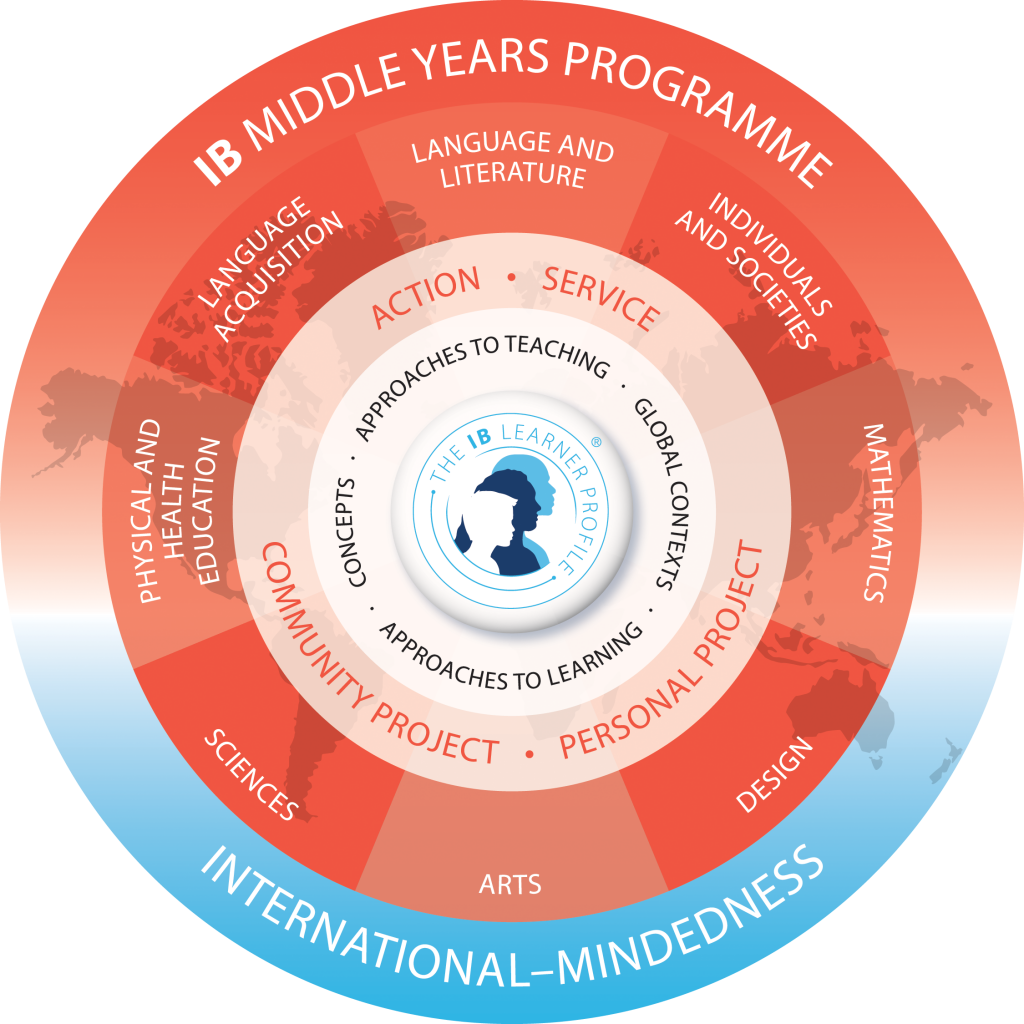
The MYP principles are deeply rooted in intercultural awareness , holistic education and communication. We at GMIS believe in the same and hence the students in grade 6-10 are exposed to and immersed into curriculum that ensures that the students do not see knowledge as compartments but view it as a whole, where each part is significant.
the students study eight subject group and there is equal importance given to each subject group as shown in the IB MYP curriculum model. The minds of adolescents is constantly questioning and inquiring, this inherent ability of the students is explored by the areas of Interaction, which are the context through which the students are guided to view the world around theme, and they provide the students with the initiative to inquire and explore, rather than just accept knowledge.
The MYP provides a rigorous and challenging course work, where there is constant feedback regarding the progress that the students is making, the ways the student can improve and the areas where they should focus. The feedback given to the students take into account individual learning style and learning rates.
According to Alvin Toffler “The illiterate of the 21st century will not be those who cannot read and write, but those who cannot learn, unlearn and relearn.” Thus we at GMIS try to inculcate a passion for learning in our students so that they excel in all that they do and be Life Long Learners.
Our approach to teaching and learning :
The MYP aims to help students develop their personal understanding, their emerging sense of self and responsibility in their community. Teaching and learning in the MYP is underpinned by the following concepts:
Teaching and learning in context
Students
learn best when their learning experiences have context and are connected to
their lives and their experience of the world that they have experienced.
Using global contexts, MYP students develop an understanding of their common
humanity and shared guardianship of the planet through developmentally
appropriate explorations of:
- Identities and Relationships
- Personal and Cultural Identity
- Orientations in Space and Time
- Scientific and Technical Innovation
- Fairness and Development
- Globalization and Sustainability
Conceptual understanding
Concepts are big ideas that have relevance within specific disciplines and across subject areas. MYP students use concepts as a vehicle to inquire into issues and ideas of personal, local and global significance and examine knowledge holistically. The MYP prescribes sixteen key interdisciplinary concepts along with related concepts for each discipline.
Approaches to learning
A unifying thread throughout all MYP subject groups, approaches to learning (ATL) provide the foundation for independent learning and encourage the application of their knowledge and skills in unfamiliar contexts. Developing and applying these social, thinking, research, communication and self management skills helps students learn how to learn.
Service as action, through community service
Action and service have always been shared values of the IB community. Students take action when they apply what they are learning in the classroom and beyond. IB learners strive to be caring members of the community who demonstrate a commitment to service—making a positive difference to the lives of others and to the environment. Service as action is an integral part of the programme, especially in the MYP community project.
Inclusion and learning diversity in MYP
As
part of the MYP curriculum, schools address differentiation within the written,
taught and assessed curriculum.
This is demonstrated in the unit planner and in the teaching environment, both
of which are reviewed during programme authorization and evaluation.
The MYP allows schools to continue to meet state, provincial or national legal
requirements for students with access needs. Schools must develop an
inclusion/special educational needs (SEN) policy that explains assessment
access arrangements, classroom accommodations and curriculum modification that
meet individual student learning needs.
INTEGRATING CONTENT WITH CONTEXT
Through the contexts provided by these areas of interaction, students should become more aware of the relevance of their learning to real-world issues and should come to see knowledge, concepts, skill, and attitudes as an interrelated whole. In this way, students will appreciate that the subject groups are not isolated but complement each other. Although this must not be done to detriment learning within each subject group – each of which retains its own aims objectives and methodology-teachers should make every effort to encourage students to see connections.
A part from providing a context for students inquiry in each subject group, the areas of interaction also have an integrative function: they bring diverse subjects together under common contexts. In this way, the subject groups are linked to each area of interaction, demonstrating the interdisciplinary potential of the MYP.




















